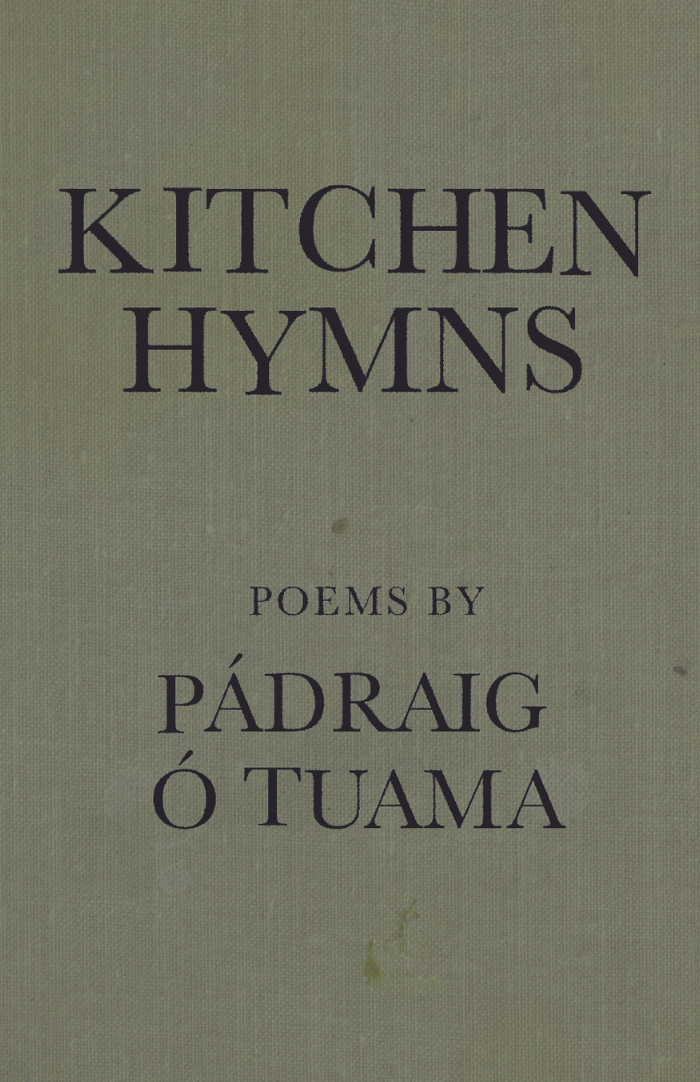
Pádraig Ó Tuama’s Kitchen Hymns opens with a question: “Do You Believe in God?” — but the bee, “gone extinct,” cannot answer, and the grass calls believe “a poor verb.” This collection trades belief for language, and philosophy is grounded in form and narrative. Kitchen Hymns is structured like a ghost mass, where even if God is a “favorite emptiness,” longing still has things to say: Jesus and Persephone meet at Hell’s exit and discuss survival; someone believes more in birds than belief; hares carry messages from the overworld to the underworld. A study in lyric address, Kitchen Hymns speaks to a shifting “you”: an unknown you; the strange you; a lover, a hated other; the you of erotic desire; the you of creation and destruction. Large themes are informed by and contained in a poetics of observation, humor, trauma, dialogics, lament, rage and praise. Delivered in finely honed melodies, shaped with force and conviction, Kitchen Hymns “reckon[s] with the empty,” and becomes “busy with a body / not a question.”
ISBN: 9781556597107
Format: Paperback
Do You Believe in God?
I turn to you,
not because I trust you,
or believe in you,
but because I need a direction for my need. You—
the space between me and death; you—
the hum at the heart of an atom; you—
nothing; you—my favorite emptiness; you—
what I turned away from and will turn to; you—
my ache made manifest in address; you,
silent you, what my friends saw as they died; you
contain what’s not containable; you
are the shape of my desire—
Reviews
“For Irish poet Padraig O Tuama, seeing the world through poetry is a calling, whether that’s his own poetry or someone else’s.”—All Things Considered on NPR
“Host of On Being’s beloved Poetry Unbound podcast, Irish poet Ó Tuama continues his search for a faith not borne strictly of religious practice. The title references Irish religious songs heard at home, suggesting the conversational tone of this meditative work. . . . VERDICT Heartfelt, questing poems for anyone reconsidering how to believe”—Barbara Hoffert, Library Journal, STARRED review
“In reflective, questing poems, Irish theologian Tuama (Poetry Unbound, 2022), a prolific lecturer and editor, unpacks the contradictory coils of life. . . . The poet grapples with doubt and disillusionment and locates answers in language. . . . Tuama is especially adept at depicting the passage of time, whether it’s the circuitous rejuvenation of sunrise (‘the way that morning is both dead and new’) or the colorful autumnal sequence of the seasons, ‘the green has gone to brass and berry, copper, ember, fire.’ Readers will enjoy this title as a return to or entry point into Tuama’s work.”—Diego Báez, Booklist
“Darkness brings revelation in this meditative offering from Ó Tuama. . . . These poetic dialogues become hymns and anti-hymns that interrogate the weight of creation. . . . The ghostly liturgy found throughout the collection feels less like a Day of the Dead celebration and more like a quiet reckoning with absence, as the poet baptizes the self into the loneliness of modern existence. It’s an admirable and noteworthy performance.”—Publishers Weekly
“Kitchen Hymns by Pádraig Ó Tuama catalogs differences between and within belief, knowledge, and memory: ‘A different time, a different god, a different violation.’ Poems are bursting with questions like ‘What’s your mother like’ and ‘When people ask where you have been, what / do you say?’ In their elegant answers, the addressee of the book keeps shifting, lines crossed between desire and repulsion, concern and hope.”—Cindy Juyoung Ok, Poetry Northwest
“A beautiful meditation on the power of faith even in the absence of belief (or is it the other way around?). Arranged in four parts, this book of wonderful poems varies from autobiographical pieces and epistolary prose poems to a series of conversations imagined between gods of ancient mythology and contemporary religion. It must be noted that this is not a tendentious work that requires the reader to share the author’s background or beliefs. Many of the poems stand on their own and speak to universal experiences.”—Greg Brown, World Literature Today
“Pádraig Ó Tuama is a person of many admirable hats, including working on peace and reconciliation organizations, and mediation organizations in Ireland. He’s also a public speaker, actively arguing against the abusive ‘conversion therapy’ for queer and gay kids. He is also a podcast host, an event coordinator. He is also a theologian, recently earning his doctorate at the University of Glasgow. His poetry is awash with all of these pursuits and experiences. Kitchen Hymns, just out from Copper Canyon Press, is no exception. . . . [It] probes faith and its invariable stickiness while simultaneously remaining open to its mystical possibilities.”—Diana Arternian, Lit Hub
“Written by the engaging host of the popular show, Poetry Unbound, the poems of Kitchen Hymns are finely honed melodies of survival—shaped with both humor and anger, force and conviction.”—Englewood Review of Books, Starred Review
“Ó Tuama is a generous, painterly writer, and his attunement to the fragile, beautiful things of the natural world, and the sharp, painful things of the human, are at the heart of this collection. . . . Kitchen Hymns holds a tremendous amount of pain in its lines, but Ó Tuama seems to thrive in the careful handling of turbulent feelings.”—Dave Coates, Poetry Book Society Bulletin
“Ó Tuama trades dogma for the knowing that comes through experience and touch, reckoning with religious trauma, queer desire, rage, and grief. God becomes a ‘favorite emptiness,’ ‘believe’ becomes ‘a poor verb.’ The body is sacramental in these poems, which are simultaneously vulnerable and erotic, full-throated hymns of joy and sadness alike.”—Kate Millar, Public Books
“The ‘nothing’ that persists—God’s seeming absence—is like an ocean wave that keeps crashing on the shore throughout the book. In a way, it is also the lynchpin that holds the poems together.”—Mary Grace Mangano, Jesuit Media Lab
